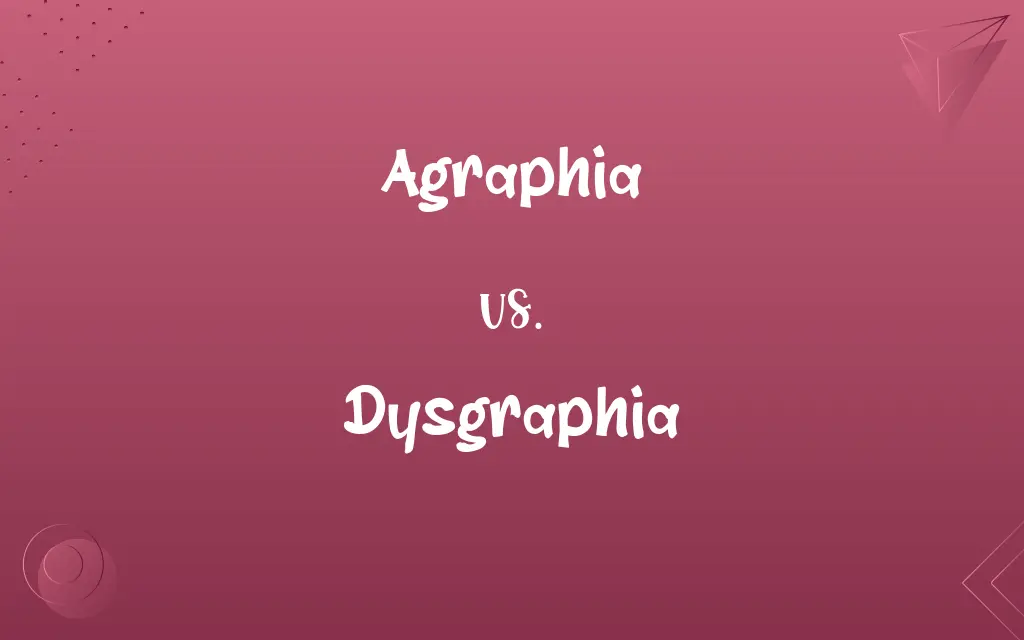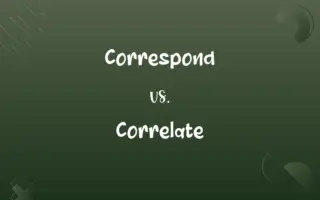Agraphia vs. Dysgraphia: Know the Difference

By Shumaila Saeed & Hifza Nasir || Updated on March 7, 2024
Agraphia is the loss of the ability to write, often due to brain damage, while dysgraphia is a neurological disorder characterized by difficulty in writing, primarily affecting handwriting and coherence.

Key Differences
Agraphia results from brain injuries, neurological disorders, or other medical conditions that impair writing ability, making it difficult or impossible for individuals to express thoughts through writing. Dysgraphia, on the other hand, refers to a learning disability that affects writing abilities, including handwriting, spelling, and the organization of ideas. It does not necessarily stem from brain damage but from inherent difficulties in processing written language.
Hifza Nasir
Mar 07, 2024
Individuals with agraphia may completely lose the ability to write, experiencing a total disconnection between the cognitive understanding of language and the motor skills required to produce written words. Dysgraphia sufferers can usually write to some extent but face challenges in making their writing legible, correctly spelled, or logically structured. While agraphia is often acquired after already learning to write, dysgraphia is typically identified in the early stages of learning to write.
Shumaila Saeed
Mar 07, 2024
The causes of agraphia can vary widely, from strokes and traumatic brain injuries to dementia and other neurological conditions. Dysgraphia, however, is believed to be caused by underlying problems in neurological development affecting fine motor skills, memory, or processing speeds, making it difficult to learn and execute the task of writing.
Shumaila Saeed
Mar 07, 2024
Rehabilitation for agraphia focuses on relearning writing skills through occupational or speech therapy, depending on the underlying cause of the impairment. Dysgraphia treatments often involve educational interventions, such as specialized teaching techniques, the use of assistive technology, and accommodations like allowing for oral assessments or providing more time for written tasks.
Shumaila Saeed
Mar 07, 2024
Both conditions impact an individual's ability to communicate through writing but differ significantly in their origins, implications, and treatments. Agraphia is about losing a previously acquired skill due to damage, while dysgraphia is about the struggle to acquire or efficiently execute writing skills due to a learning disability.
Hifza Nasir
Mar 07, 2024
ADVERTISEMENT
Comparison Chart
Cause
Brain damage or neurological condition
Neurological learning disability
Shumaila Saeed
Mar 07, 2024
Symptoms
Inability to write
Poor handwriting, spelling errors, disorganized writing
Shumaila Saeed
Mar 07, 2024
Onset
Typically after an injury or illness
Often noticed in early learning stages
Shumaila Saeed
Mar 07, 2024
Treatment
Rehabilitation (occupational/speech therapy)
Educational interventions, assistive technology
Dua Fatima
Mar 07, 2024
ADVERTISEMENT
Agraphia and Dysgraphia Definitions
Agraphia
Requires rehabilitation for improvement.
She attends speech therapy sessions to overcome her agraphia.
Shumaila Saeed
Mar 07, 2024
Dysgraphia
Difficulty with writing, affecting handwriting and coherence.
Dysgraphia makes it hard for Emma to write legibly.
Dua Fatima
Mar 07, 2024
Agraphia
Loss of a previously acquired writing skill.
Agraphia has made it impossible for her to express her thoughts on paper.
Hifza Nasir
Mar 07, 2024
Dysgraphia
A learning disability with neurological origins.
Dysgraphia is diagnosed through a comprehensive evaluation of writing skills.
Hifza Nasir
Mar 07, 2024
Agraphia
Inability to write due to brain damage.
After the stroke, John developed agraphia and could no longer write his name.
Dua Fatima
Mar 07, 2024
ADVERTISEMENT
Dysgraphia
Addressed through educational interventions.
Specialized teaching strategies help students with dysgraphia improve their writing.
Shumaila Saeed
Mar 07, 2024
Agraphia
Can result from various neurological issues.
Agraphia can be a symptom of Alzheimer's disease.
Shumaila Saeed
Mar 07, 2024
Dysgraphia
May involve the use of assistive technology.
Voice-to-text software is a helpful tool for those with dysgraphia.
Hifza Nasir
Mar 07, 2024
Agraphia
Impacts ability to communicate in written form.
Agraphia has significantly affected his professional life.
Shumaila Saeed
Mar 07, 2024
Dysgraphia
Manifests in poor spelling and disorganized writing.
His essays are hard to read due to dysgraphia.
Hifza Nasir
Mar 07, 2024
Dysgraphia
A neurological disorder marked by impairment of the ability to write, especially to write by hand and to spell. It can occur as the result of brain damage or in association with learning disabilities.
Shumaila Saeed
Oct 19, 2023
Agraphia
(pathology) A loss of the ability to write (usually resulting from a brain injury).
Shumaila Saeed
Oct 19, 2023
Agraphia
The absence or loss of the power of expressing ideas by written signs. It is one form of aphasia.
Shumaila Saeed
Oct 19, 2023
Agraphia
A loss of the ability to write or to express thoughts in writing because of a brain lesion
Shumaila Saeed
Oct 19, 2023
Repeatedly Asked Queries
What is the main difference between agraphia and dysgraphia?
The main difference is that agraphia is the loss of writing ability due to brain damage, while dysgraphia is a learning disability causing difficulty with writing.
Hifza Nasir
Mar 07, 2024
How is agraphia diagnosed?
Agraphia is diagnosed through neurological assessments and tests to understand the extent of the impairment and its impact on writing.
Dua Fatima
Mar 07, 2024
What causes dysgraphia?
Dysgraphia is caused by neurological differences affecting fine motor skills and writing processes, though the exact causes can vary among individuals.
Hifza Nasir
Mar 07, 2024
Can someone with agraphia still read?
Agraphia specifically affects writing ability; however, it is possible for individuals to retain their reading abilities, depending on the brain areas affected.
Shumaila Saeed
Mar 07, 2024
Are there different types of dysgraphia?
Yes, dysgraphia can manifest in various forms, including motor, spatial, and phonological dysgraphia, each affecting different aspects of writing.
Shumaila Saeed
Mar 07, 2024
Is dysgraphia just about bad handwriting?
Dysgraphia affects more than just handwriting; it also impacts spelling, organization of writing, and sometimes the ability to express thoughts in written form.
Shumaila Saeed
Mar 07, 2024
Can adults have dysgraphia?
While dysgraphia is often identified in children, adults can also have dysgraphia, especially if it was not diagnosed or adequately addressed in childhood.
Shumaila Saeed
Mar 07, 2024
Is agraphia common after a stroke?
Agraphia can occur after a stroke, especially if the stroke affects areas of the brain responsible for language and writing.
Shumaila Saeed
Mar 07, 2024
What types of interventions are effective for dysgraphia?
Interventions include educational strategies, occupational therapy, use of assistive technology, and accommodations in the learning environment.
Hifza Nasir
Mar 07, 2024
Can agraphia be cured?
Agraphia treatments depend on the underlying cause; some cases may improve with therapy, while others might be permanent.
Shumaila Saeed
Mar 07, 2024
Share this page
Link for your blog / website
HTML
Link to share via messenger
About Author
Written by
Shumaila SaeedShumaila Saeed, an expert content creator with 6 years of experience, specializes in distilling complex topics into easily digestible comparisons, shining a light on the nuances that both inform and educate readers with clarity and accuracy.
Co-written by
Hifza Nasir






































































